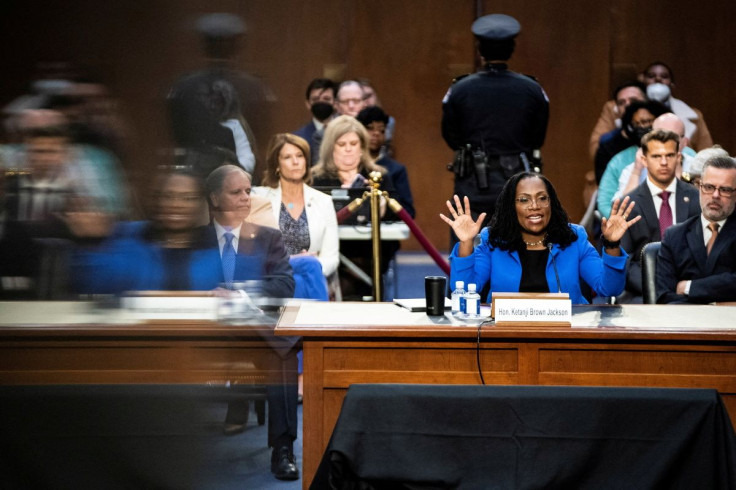Senate Set To Confirm Jackson As First Black Woman On U.S. Supreme Court

The U.S. Senate was set on Thursday to confirm Ketanji Brown Jackson as the first Black woman to serve on the Supreme Court, a milestone for the United States as President Joe Biden seeks to infuse the federal judiciary with a broader range of backgrounds.
The Democratic president in February nominated the 51-year-old federal appellate judge to a lifetime job on the nation's top judicial body to succeed the retiring 83-year-old Justice Stephen Breyer. The Senate scheduled its vote to begin at 1:45 p.m. (1745 GMT).
Jackson's confirmation appears secure as three Republicans - Susan Collins, Lisa Murkowski and Mitt Romney - have committed to back her alongside the Democrats. The Senate on Monday decided to move forward with the nomination on a 53-47 vote after the Judiciary Committee had deadlocked on the nomination along party lines. A simple majority is needed for confirmation.
If confirmed, Jackson would take Breyer's place on the liberal bloc of a court with an increasingly assertive 6-3 conservative majority. Breyer is due to serve until the court's current term ends - usually in late June - and Jackson would be formally sworn in after that. Jackson served early in her career as a Supreme Court clerk for Breyer.
Before Jackson joins the bench, the Supreme Court is due to rule in major cases including one that could overturn the landmark 1973 decision that legalized abortion nationwide and another that could expand gun rights.
Vice President Kamala Harris, who became the first Black woman to hold that post after Biden selected her as his 2020 election running mate, was set to preside over the vote. A Harris spokesperson said the vice president believes Jackson will become an "exceptional" justice.
Jackson overcame widespread opposition among Republicans to win confirmation including attacks on her sentencing record as a trial judge and their attempt to paint her as a liberal activist who bends rulings to fit her own beliefs.
'DOUBLE JEOPARDY'
Senator Raphael Warnock, one of the chamber's three Black members, said in debate before the vote: "I'm the father of a young Black girl. I know how much it means for Judge Jackson to have navigated the double jeopardy of racism and sexism to now stand in the glory of this moment. ... Seeing Judge Jackson ascend to the Supreme Court reflects the promise of progress on which our democracy rests. What a great day it is in America."
Senator Chuck Grassley, the Judiciary Committee's top Republican, complained that Republicans were not given documents on Jackson's record that they requested and faulted her judicial record, accusing her of shaping rulings to fit her beliefs.
Biden appointed Jackson last year to the U.S. Court of Appeals for the District of Columbia Circuit after she spent eight years as a federal district judge. Like the three conservative justices appointed by the Democrat Biden's Republican predecessor Donald Trump, Jackson is young enough to serve for decades in the lifetime job.
During her confirmation hearings, Jackson noted that she was born in 1970 in the aftermath of congressional passage of major civil rights laws aimed at curbing discrimination against Black people and other minorities in voting, housing, employment, public accommodations and other areas. Jackson referenced the fact that her parents had experienced lawful racial segregation first-hand in their hometown of Miami.
Jackson said what she hopes to bring to the Supreme Court is similar to what the prior 115 justices have delivered: their own life experiences and perspectives. She said hers included time as a federal judge, a court-appointed lawyer for criminal defendants who could not afford an attorney, a member of a federal commission on criminal sentencing and "being a Black woman, lucky inheritor of the civil rights dream."
Biden has aimed to bring more women and minorities and a broader range of backgrounds to the federal judiciary. His appointment of Jackson made good on a pledge he made during the 2020 presidential campaign to name a Black woman to the Supreme Court, which has had only two Black justices, both men: Clarence Thomas, appointed in 1991 and still serving, and Thurgood Marshall, who retired in 1991 and died in 1993.
Jackson is set to become the sixth woman ever to serve on the Supreme Court, joining current members Amy Coney Barrett, Elena Kagan and Sonia Sotomayor, the retired Sandra Day O'Connor and Ruth Bader Ginsburg, who died in 2020. Sotomayor is the only Hispanic ever to serve as a justice. The Supreme Court was founded in 1789.
© Copyright Thomson Reuters 2024. All rights reserved.





















